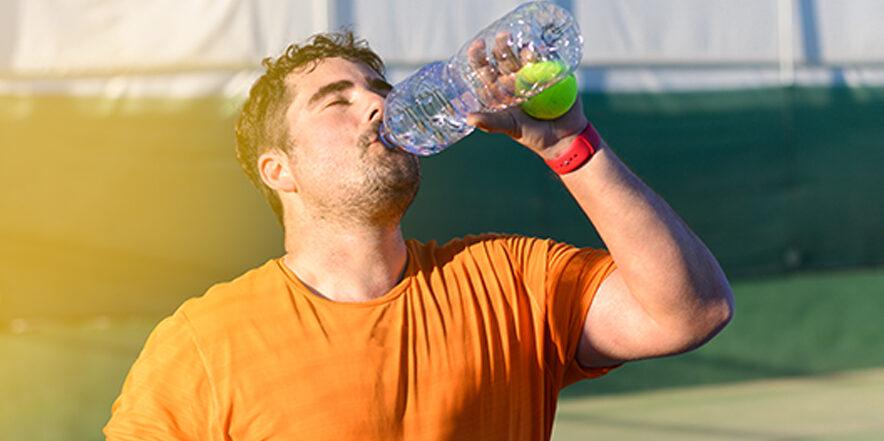
Summer is finally here, and with summer comes the hot weather. For those who spend time outside during this time of year, staying hydrated is important for health and optimal function. Proper hydration benefits the whole body: it keeps cool in the heat by allowing our bodies to sweat and also by maintaining proper blood volume. The blood vessels dilate near the skin to allow heat to dissipate into the air (our faces get red for good reason). Maintaining proper hydration keeps joints lubricated, and allows for exchange of nutrients and waste products throughout the body.
Dehydration leads to the inability to sweat and to low blood volume, limiting the body’s ability to cool itself. The heart works harder to circulate blood through the body. Lack of hydration causes waste products to build up and limits delivery of nutrients to working muscles. All of this leads to poor function with work outs, or just general malaise, fatigue or headache with activities like yardwork or sightseeing. Severe dehydration can lead to heat exhaustion, or the more severe, heat stroke.
Heat exhaustion occurs when dehydration becomes serious. Symptoms include excessive sweating with cold/clammy skin, feeling faint/nauseous, headache, muscle cramps and weakness. At this time, it is vital to get out of the sun, and to rest and re-hydrate. Heat stroke is a medical emergency, and requires immediate medical attention via going the emergency room or calling 911. Symptoms include throbbing headache, rapid pulse, nausea/vomiting, dry/flushed skin, confusion, decreased urination and increased body temp (103-104). Heat stroke can lead to loss of consciousness, damage to the muscles/organs, seizures and in severe cases can be fatal.
So how does one stay properly hydrated? It’s difficult to know how much to drink throughout the day. A good rule of thumb is to divide your body weight by two. This should be the number of ounces consumed during a day. For example, if you weigh 150 pounds, 75 ounces is a good estimate of the necessary fluid intake. Remember, fluid rich foods like watermelon and cucumber contribute toward this. Many people like to add these same foods to flavor their water. Coffee and tea should not be the only source of fluids as they are diuretics (they increase urination).
Another helpful hint is to monitor the color of urine. It should be the color of light lemonade. If it’s darker, you are dehydrated. (Some medications may interfere with this “test”).
For those who exercise intensely, another way to ensure proper hydration is to “measure” your sweat rate by weighing yourself before and after the intense activity. For every pound, you have lost, 2 ½ cups (16oz) of fluid are needed to replenish it.
Sports drinks can be helpful to athletes who exercise at a high intensity for 60-90 minutes or more. It’s necessary to replace losses of sodium, potassium and other electrolytes during long duration/intense exercise. Under normal situations most exercisers are not likely to deplete these minerals during regular training. If, however, you find yourself exercising in extreme conditions or for long times (an Ironman or ultramarathon) consider adding a sports drink with electrolytes. Sports drinks are not usually for children. High sugar drinks have finally been recognized for their contribution to childhood obesity. If your child is playing outside, offer them water or low calorie drinks instead.
Enjoying the outdoors while using common sense and simple strategies will increase enjoyment and eliminate unnecessary risks.
